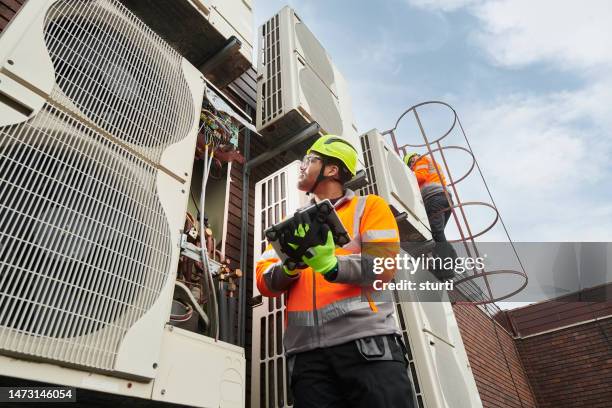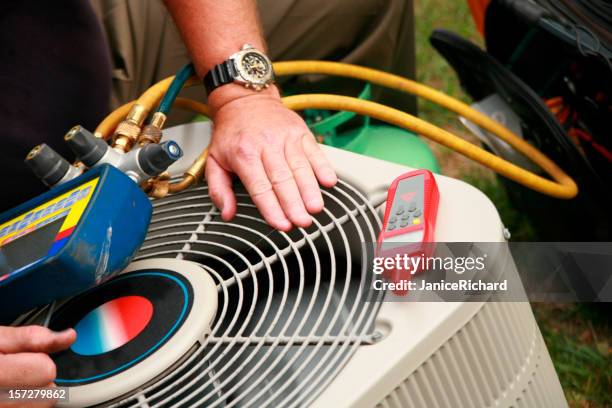Maximize Efficiency from Your heat pump installation ooltewah tn
Maximize Efficiency from Your heat pump installation ooltewah tn
Blog Article
Selecting Between a Heatpump and Heating System: Key Factors To Consider for Your Cooling And Heating Requirements
When reviewing home heating choices for a/c needs, the decision between a heatpump and a heater can be complicated. Each system provides distinct advantages tailored to specific environments and energy performance objectives. Understanding these differences is vital for making an educated choice. Trick variables such as installment prices and environmental impact further make complex the option process. Which choice truly straightens with one's convenience and sustainability preferences? The following areas will certainly check out these factors to consider in information.
Recognizing Warm Pumps: Just How They Function and Their Benefits
While many homeowners consider different home heating alternatives, understanding exactly how heat pumps feature and their benefits can substantially influence their decision. Heatpump run by transferring heat as opposed to producing it. In the winter season, they extract warm from the outside air or ground and move it inside, while in the summertime, they reverse this procedure, cooling the home by getting rid of warmth outside. This double capability makes them functional for year-round environment control.One of the primary advantages of heat pumps is their power effectiveness. They make use of significantly much less power contrasted to typical heater, potentially causing reduced utility expenses (heat pump replacement ooltewah tn). In addition, heatpump have a smaller sized carbon impact, making them an eco pleasant choice. They also call for much less maintenance than conventional systems, contributing to long-lasting price financial savings. Overall, understanding the auto mechanics and advantages of heatpump can aid homeowners make educated decisions concerning their home heating and cooling down requirements
Discovering Heating Systems: Types, Operation, and Advantages
Heaters are available in numerous kinds, consisting of gas, electric, and oil models, each with unique operational mechanisms. Comprehending these differences is necessary, as they affect efficiency and home heating efficiency. In addition, furnaces use many advantages, such as constant warm output and integrity in colder environments.
Kinds of Heaters
Furnace can differ significantly in layout and procedure, with furnaces being a prominent choice among property owners. There are several kinds of heating systems, each making use of various fuel sources and modern technologies. Gas heating systems prevail, leveraging natural gas to create warmth successfully. Electric heating systems, on the various other hand, use electric resistance to produce warmth, usually preferred for their uncomplicated setup. Oil heaters, while much less usual, are efficient in areas with minimal gas access (heat pump service). In addition, condensing heaters make best use of energy effectiveness by recording and recycling exhaust gases. Each type operates via a system of warm exchangers and ductwork to distribute warm air throughout a home. Recognizing the differences in between these heater kinds is essential for educated cooling and heating decisions
Benefits of Heaters
For house owners looking for reliable warmth during chilly months, the benefits of furnaces are significant. Heaters supply constant heating, guaranteeing also temperatures throughout the home. They are especially efficient in extreme cold, typically outperforming heatpump in cold problems. Numerous types, including gas, electric, and oil furnaces, provide adaptability to satisfy varied requirements and preferences.Furnaces also often tend to have reduced first setup costs contrasted to heatpump, making them an extra available choice for many. Their robust layout adds to a much longer life expectancy, with lots of systems lasting over 15 years with correct upkeep. In addition, modern heating systems are typically equipped with advanced innovation for boosted efficiency, which can cause minimized power bills. Overall, furnaces stay a dependable choice for reliable home heating.

Energy Performance: Comparing Warm Pumps and Furnaces
When comparing power efficiency in between heatpump and heaters, the Seasonal Energy Effectiveness Proportion (SEER) plays a vital function in determining efficiency. Additionally, an operational expense evaluation exposes the lasting monetary ramifications of each system. Comprehending these variables can direct property owners in making informed decisions about their heating options.
Seasonal Power Efficiency Ratio
Power performance plays an important duty in the decision-making process in between heat pumps and heating systems, specifically when taking into consideration the Seasonal Energy Performance Proportion (SEER) This metric procedures the cooling performance of warmth pumps over a whole cooling season, giving a standard way to review performance. Greater SEER rankings show higher power efficiency, translating to lower energy usage and decreased energy costs. On the other hand, furnaces are usually evaluated using the Yearly Gas Usage Efficiency (AFUE) score, which mirrors home heating effectiveness. When contrasting these 2 systems, property owners must focus on SEER rankings for warm pumps, as they directly influence overall power savings and ecological sustainability. A thorough understanding of SEER can notably affect his explanation the lasting complete satisfaction and cost-effectiveness of the picked a/c solution.
Operational Expense Analysis
Understanding the operational expenses associated with heat pumps and furnaces is important for house owners reviewing their alternatives. Heatpump typically supply greater power efficiency, converting electric power into warmth with minimal waste. This results in lower monthly energy costs, specifically in modest environments. Conversely, traditional heating systems, particularly gas models, might have reduced ahead of time prices but can incur greater functional costs over time because of fuel rates and efficiency ratings.Moreover, heatpump can operate as both home heating and cooling down systems, possibly decreasing the demand for separate a/c units. While first investments for warm pumps may be greater, their long-term financial savings in energy effectiveness can make them a more affordable choice for lots of homes. Mindful evaluation of regional power prices is important to figure out the ideal option.
Installation Costs: What to Anticipate for each and every Heater
Setup prices for heater can differ significantly between warm pumps and furnaces, influencing house owners' choices. Heat pumps generally have higher ahead of time installation prices, typically ranging from $3,500 to $8,000, relying on the device size and complexity of setup. This consists of the outdoor system, indoor handling system, and needed ductwork modifications. Conversely, heaters have a tendency to have reduced first expenses, balancing between $2,500 and $6,000, which can be appealing for budget-conscious home owners. However, setup costs can increase if comprehensive ductwork is required.Moreover, the selection of gas type for heaters-- natural gas, gas, or electrical-- can also affect installation costs. While warmth pumps supply power efficiency, their first investment may deter some buyers. Ultimately, reviewing installation prices together with long-lasting financial savings and performance will certainly help home owners in making informed choices concerning their furnace.
Climate Factors To Consider: Which System Carries Out Better in Your Location
Exactly how do environment problems influence the efficiency of heater? The performance of warm pumps and furnaces can vary significantly depending upon the neighborhood climate. In modest environments, heatpump succeed by successfully transferring heat from the outside air, making them an energy-saving alternative. Their efficiency diminishes in very chilly temperatures, where they might have a hard time to draw out sufficient warmth. On the other hand, furnaces, specifically gas versions, provide trusted and consistent warm no matter outdoor problems, making them better in colder regions.In areas that experience milder winters months, warmth pumps can run efficiently year-round, providing both heating & cooling. On the other hand, regions with severe winters months often take advantage of the robustness of furnaces. Eventually, comprehending the neighborhood environment is essential when making a decision between a heatpump and a heater, as it directly influences their operational effectiveness and overall efficiency.
Upkeep Needs: Long-Term Look After Warmth Pumps vs. Furnaces
While both warmth pumps and heating systems require routine maintenance to assure peak performance, their details requirements and care regimens differ significantly. Heating systems generally need much less frequent focus, with annual inspections sufficing to look for gas leakages, clean filters, and examine total performance. Their simpler style commonly permits straightforward repairs.In contrast, heatpump necessitate semiannual upkeep due to their double duty in cooling and heating. This includes cleansing coils, inspecting cooling agent degrees, and making certain that both the interior and exterior systems function at their ideal. Additionally, warmth pump upkeep commonly involves more intricate parts, making expert click over here now servicing essential.Neglecting maintenance can lead to reduced efficiency and increased power expenses for both systems. Ultimately, property owners need to think about these long-lasting treatment demands when choosing in between a heat pump and a heater, as aggressive upkeep can extend the life-span and performance of either system substantially.
Ecological Impact: Choosing a Lasting Heating Alternative
The ecological influence of furnace is a crucial evaluation for home owners seeking lasting options. Warm pumps are generally more energy-efficient than standard heaters, as they transfer warm instead of produce it, greatly reducing carbon discharges. By utilizing renewable resource sources, such as air-source or geothermal heat pumps, home owners can even more minimize their ecological footprint.On the various other hand, natural gas furnaces send out greenhouse gases and add to air pollution, though they typically offer higher heat result. Nonetheless, improvements in innovation have caused the development of high-efficiency furnaces that decrease emissions.Ultimately, choosing a furnace involves considering efficiency versus ecological effect. Property owners are motivated to assess local power sources and incentives for renewable systems, ensuring a selection that straightens with both personal comfort and ecological duty. The choice affects not just prompt convenience yet additionally long-lasting sustainability and ecological health.
Often Asked Questions
The Length Of Time Do Warm Pumps and Furnaces Generally Last?
The life-span of heatpump normally varies from 15 to two decades, while furnaces can last between 15 to thirty years. Regular upkeep considerably influences their long life and efficiency in giving home heating remedies.
Can I Utilize a Heatpump in Very Cold Climates?
Heatpump can operate in extremely chilly climates, yet their efficiency diminishes as temperature levels decrease. In such conditions, additional home heating sources may be necessary to keep comfortable indoor temperature levels and ensure peak efficiency.

What Is the Sound Degree of Heat Pumps Versus Furnaces?
The sound levels of heatpump and heaters vary considerably. Usually, heat pumps operate even more silently than traditional furnaces, making them more effective for those delicate to seem, while heating systems might generate louder functional sounds throughout home heating cycles.
Are Heat Pumps Suitable for Both Cooling And Heating?
Heatpump are indeed suitable for both heating and cooling (ductless mini splits). They work by moving heat, offering reliable temperature level control year-round, making them a functional selection for homeowners seeking an all-in-one heating and cooling remedy
What Size Heating Unit Do I Need for My Home?
Determining the appropriate dimension heating system for a home needs evaluating factors such as square footage, insulation high quality, local climate, and the home's layout. Consulting an expert can guarantee an accurate evaluation and suitable convenience. Heat pumps commonly provide greater energy performance, converting electric power into heat with minimal waste. In browse around this site modest environments, warmth pumps excel by effectively transferring warmth from the outside air, making them an energy-saving choice. Conversely, heaters, especially gas designs, provide constant and reliable heat regardless of outside conditions, making them better in colder regions.In areas that experience milder wintertimes, warmth pumps can operate properly year-round, giving both heating and cooling. Warm pumps are generally more energy-efficient than typical heating systems, as they transfer warm rather than produce it, substantially lowering carbon emissions. By utilizing sustainable power sources, such as air-source or geothermal warm pumps, property owners can further reduce their eco-friendly footprint.On the various other hand, all-natural gas furnaces send out greenhouse gases and add to air contamination, though they commonly give higher warmth output.
Report this page